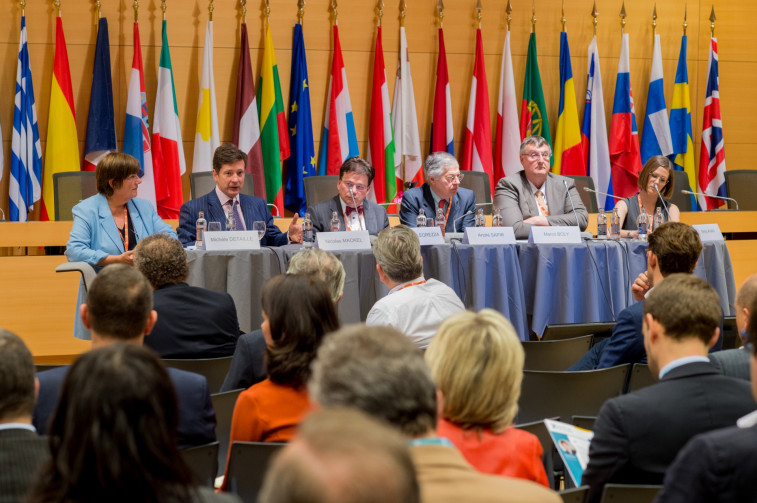13th Journée de l’Economie
Protectionism, nationalism and global trade tensions under the spotlight
Organised by the Ministry of the Economy, the Luxembourg Chamber of Commerce and FEDIL – The Voice of Luxembourg’s Industry, in cooperation with PwC Luxembourg, this year’s Journée de l’Economie (Jecolux) was all about putting focus on global trade tensions and on ways to navigate uncharted waters. Throughout the day, experts from business, academia and politics discussed critical issues affecting trade and economic relations in the world.
Protectionism and Brexit
In recent years, there has been a conspicuous resurgence in global trade protectionism that has put the framework for open rules-based trade under multiple threats. Two of the world’s economic giants are almost at the brink of a trade war: the US having introduced several measures against Chinese imports and China having promptly retaliated back. And of course, there’s the big question mark that is Brexit.
The elephant in the room was tackled by Emily Khan, Beyond Brexit Lead at PwC UK. Her talk highlighted the unintended consequences of Brexit, and how Brexit is leaving businesses paralysed. Khan’s advice to dealing with the growing trade uncertainties that loom around the topic was for companies to refocus on their future market strategy, compliance and sustainability in global markets. In a note of optimism, she added, "Try to ignore the politics. Play to your strengths. Plan for the worst but hope for the best.”
Is free trade sustainable?
One of the principle topics discussed during the event was the state of international trade and how it’s been affected by recent global socio-political developments. In the wake of the transformations that the world has undergone in recent years – be it in the form of unprecedented technological breakthroughs or an important geo-political shift towards nationalism – trade is now in a state of global uncertainty.
André Sapir, Economics Professor at the Université libre de Bruxelles, who was a keynote speaker at the event, expressed his concerns regarding the future of globalisation and free trade amidst all these uncertainties. “The combination of great transformation and recession have created the political difficulties and triggered the rise of populism, which goes hand in hand with nationalism and protectionism,” he said. “Is globalisation sustainable? I am a little less optimistic today than I was 10 years ago, because the system is less resilient, and the crisis has left its mark.”
Discussing the potential impacts of a full-blown trade war and how such a scenario would be severely damaging for smaller countries, but also for the three major global powers (EU, United States and China), Sapir suggested that the World Trade Organisation (WTO) review its trade agreement policies and addresses the issue of taxation. “Social cohesion costs money. How do we fund this? Through taxes,” he said.
Towards economic sanity
Similar thoughts on globalisation and its impacts were also put forth by Dani Rodrik, Ford Foundation Professor of International Political Economy at Harvard University, during his keynote speech. “We should be looking towards a globalisation that works for all countries,” he said, “Countries that have enjoyed the benefits of globalisation should be more tolerant towards their peers that haven’t been so fortunate.” Talking about a “sane global economy”, he also added, “It can only be reached if individual countries make sure their economies are healthy and inclusive. This means investing in people, education, health, redistributing income, providing social insurance and ensuring that people have jobs that are stable and are commensurate with their skills and abilities.”
The existing skills gap, and how businesses can play an important role in changing this, was also taken up by John Parkhouse, CEO PwC Luxembourg, in his keynote speech. During his talk he referred to PwC’s annual CEO survey which this year showed “a record jump in pessimism”. This is not only due to concerns about policy uncertainties and trade conflicts but, and very importantly, global unavailability of the right skills. Talking about how this is a major challenge in the world and particularly for Luxembourg, he emphasised the importance of, “…a significant focus on the need to drive retraining. From a business perspective, the whole agenda on upskilling is now mission critical in terms of our ability to close the talent gap.”
State of the nation
One thing that most experts in attendance at this year’s Jecolux agreed on was that Luxembourg is fairing well amidst all of the global economic tensions. Sapir attributed it to “good governance and the confidence that people have in the country’s government”. While Rodrik credited the country’s well-being to its strong competitive advantage, he also said, “Luxembourg is not totally immune to present or future global economic crises”. “Countries like Luxembourg or Singapore have a role to play in being more tolerant to other countries’ problems and be advocates of a globalisation that’s sustainable for all,” he added.
Present at the event were also Carlo Thelen, Director General, Luxembourg Chamber of Commerce and Etienne Schneider, Luxembourg’s Deputy Prime Minister and Minister of the Economy.
Communiqués liés
Emerging Trends in Real Estate®: Europe 2024
According to the latest Emerging Trends in Real Estate® Europe report from PwC ...
PwC Luxembourg: Best ESG (Environmental, Social and Governan...
The CFI.co judges have conferred on PwC Luxembourg the 2023 award for Best ESG (...
New Managing Partner and the Country Leadership Team for PwC...
It is with great pleasure that PwC Luxembourg announces that François Mousel as...
Use of Data Analytics and Artificial Intelligence in Luxembo...
PwC Luxembourg has just released the results of its survey: “Use of Data Analy...
Growing for the future: 18 New Partners and 5 Managing Direc...
With a record number of promotions, PwC Luxembourg is proud to announce the admi...
PwC Luxembourg publishes The SFDR Barometer for Management C...
PwC Luxembourg publishes The SFDR Barometer for Management Companies.
Il n'y a aucun résultat pour votre recherche







